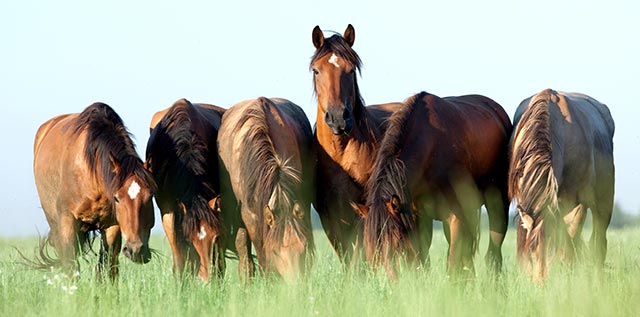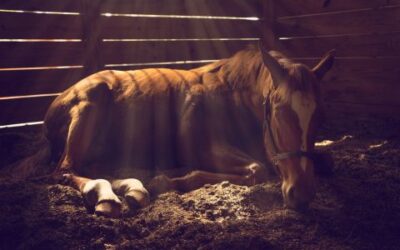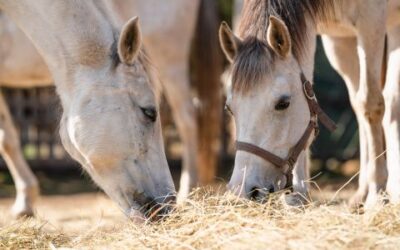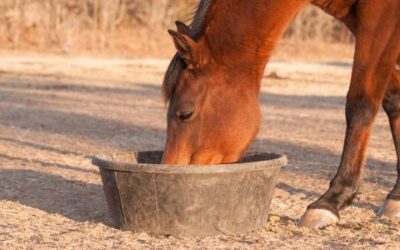 Immunization is the first line of defense for protecting against several serious diseases — it’s simply the most effective way to maintain a healthy horse and herd. This year is no exception. In recent months, disease concerns have heightened in New England, causing concern for domestic animals, farm animals, and humans. Lucerne Farms asked New England Equine Medical and Surgical Center in New Hampshire about the most asked-about immunizations of 2018, how to keep your herd safe, and strategies to limit exposure — for you and your four-footed charges.
Immunization is the first line of defense for protecting against several serious diseases — it’s simply the most effective way to maintain a healthy horse and herd. This year is no exception. In recent months, disease concerns have heightened in New England, causing concern for domestic animals, farm animals, and humans. Lucerne Farms asked New England Equine Medical and Surgical Center in New Hampshire about the most asked-about immunizations of 2018, how to keep your herd safe, and strategies to limit exposure — for you and your four-footed charges.
Rabies Comes Close to Home
In Maine, this fall will close out a summer fraught with concerns about rabies. A series of attacks from rabid animals in the Midcoast area in June put residents on high alert as encounters with infected raccoons and wolves were a seemingly regular occurrence. There have been 48 confirmed cases of rabies in animals in Maine so far this year according to the Maine Center for Disease Control and Prevention. While this is by no means a record, rabies has increased over the decades, unnerving residents with each instance. It’s no surprise, considering that rabies is an untreatable disease that can cause death within days.
Rabies, a viral disease that causes encephalitis, is spread through infected saliva from a bite, and is fatal for animals and humans. Rabid animals act aggressively and are quick to bite whatever is in their path – in some cases, straying into neighborhoods and backyards. While humans and domestic animals can be vulnerable, horses, too, can be exposed to a bite from a rabid animal on the move. Once clinical signs appear, there are no treatment options. And, humans can become exposed to the disease when they come into contact with the saliva of an infected horse or other animal.
Common Core Vaccinations
Tetanus and the 2 encephalitis vaccines are usually given as a “3-way” vaccination, meaning they are given as one injection.
- Tetanus Toxoid
- Eastern Equine Encephalitis/
- Western Equine Encephalitis
- West Nile Virus
- Rabies
These risks have led to extra urgency for horse owners to be sure regular immunizations are up to date. “This time of year, many horses spend a large part of the day turned out,” said Kathy Samley, DVM. “This puts them at an increased risk of coming into contact with potentially rabid wildlife.” The vaccine, recommended to every horse annually, is highly effective at preventing the deadly disease, Samley advised, and is always part of the core immunizations for all horses. In addition to ensuring vaccines are current, it is also wise for horse owners to minimize the chances of interacting with wildlife, raccoons, and skunks, particularly when clusters of incidences occur in small areas. Good preventative practices include making sure food sources that attract animals, including grain and feed, is stored.
West Nile Virus: New Concerns for Maine
West Nile Virus, a disease that has not commonly caused alarm in the U.S., also edged onto the radar this year. In August, The Maine Center for Disease Control and Prevention reported a mosquito pool tested positive in York County, raising new concerns, in no small part because of how it is contracted — through mosquitoes, an unavoidable part of life in New England states and elsewhere.
 West Nile Virus and Eastern Equine Encephalitis are both carried by mosquitoes that pick it up from infected wild birds. Horses appear to be particularly susceptible to infection, which can cause severe neurological symptoms. For horses, vaccines against these diseases has been part of core immunization requirements for several years, and while it is not a guarantee of protection and will not offer protection for owners or other animals, it is the best method of prevention for all mammals and remain the best defense.
West Nile Virus and Eastern Equine Encephalitis are both carried by mosquitoes that pick it up from infected wild birds. Horses appear to be particularly susceptible to infection, which can cause severe neurological symptoms. For horses, vaccines against these diseases has been part of core immunization requirements for several years, and while it is not a guarantee of protection and will not offer protection for owners or other animals, it is the best method of prevention for all mammals and remain the best defense.
“West Nile Virus has been present along the east coast for many years, but recently there have been some additional cases in the New England area,” said Samley. “It is important to ensure that your horse is up to date on their core vaccinations, and booster them as soon as possible if they are out of date.” The vaccination schedule is an initial two dose series, four to six weeks apart, with a yearly booster before the vector season, or more frequently in higher risk areas. Reducing exposure to mosquitos that may carry disease is also recommended, which means extra vigilance is warranted in eliminating breeding sites such as stagnant water, keeping gutters clean, and checking property for buckets, pots, cans for recycling, wheelbarrows, and old tires that might hold water — fixtures of many farms to be sure.
Equine Influenza: Minimizing a Troublesome Virus
Flu doesn’t always wait for cold weather, and shots shouldn’t either. Widely recommended for the human population, immunizing against Equine Influenza can make the season easier for all members of the family farm. Odds are good that a horse will come in contact with this common respiratory infection — it’s highly contagious and will cause fever, not eating, and lethargy, and may pose other serious risks. For competitive horses, it can lead to extended down time in recovery and weeks of disrupted schedules.
“Optional” Vaccinations
Considered based on geography, herd population, and travel or between individual horses in a population.
- Equine Herpes Virus 1&4 (Rhinopneumonitis)
- Equine Influenza
- Strangles
- Potomac Horse Fever
- Rota Virus
- Lyme Disease
- Equine Viral Arteritis (EVA)
The Equine Influenza vaccine is usually considered a optional immunization, and Samley said they recommend vaccinating at-risk horses for Equine Influenza, which includes young horses, as well as show horses that frequently come into contact with other horses. Travelers are particularly susceptible, as are horses that share water or feed troughs, for example.
The vaccine is typically given every six to 12 months depending on the type and the horse’s level of risk, and is often given in combination with a rhinopneumonitis, or Equine Herpes Virus vaccine since the risk factors are similar between the two diseases. As with all immunizations, your veterinarian is your primary resource for information about whether the vaccine is right for your circumstances.
Be sure to ask your vet about establishing a custom schedule, confirming your horse is up to date on important core immunizations, and finding out more about optional vaccines. They can even help you find out about free vaccination opportunities in your area.




